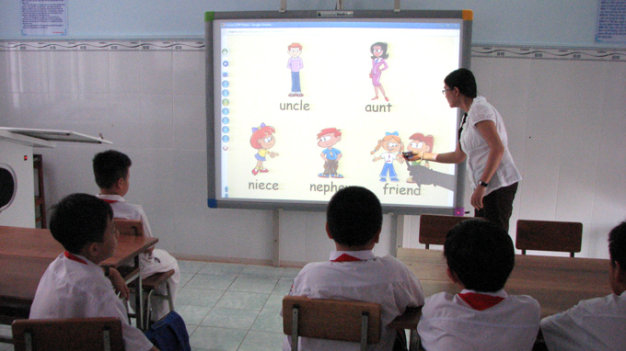Editor’s note: Van Nguyen is a graduate student in applied linguistics from the University of Melbourne, with a background and interest in technology in second language teaching.
Van has joined Tuoi Tre News’ discussion on whether music and smart boards should be banned in English teaching. Share your opinion with us in the comment box below or mail it to ttn@tuoitre.com.vn.
As a language teacher and applied linguist, the news of a ban on audiovisual tools and technology leaves me concerned.
On one hand, I understand that many teachers overuse or misuse technology in the classroom, as some of them may turn on music or play a video and call it a day.
On the other hand, banning technology is such a backward move, especially in the 21st century where technology is increasingly being used in education.
As I see it, the problem is not about technology itself, but how it is used in the classroom that matters.
The use of multimedia and digital tools in language teaching has been proven to bring benefits to language learning in the classroom, but it is not a panacea for every problem.
If applied in the wrong context, technology doesn’t help at all. It is necessary to consider what kind of classroom activities it should be used for, and what benefits it may bring to students' acquisition and communication.
Therefore, effective use of technology depends on the teacher’s pedagogical skills and knowledge, so it is not technology's fault per se, rather the teacher's misuse of it.
Blackboards and chalk, or smart boards and audiovisual aids are, after all, merely tools at the disposal of teachers. With or without digital aids, a good teacher will continue to deliver successful lessons, but technology will bring so much more into the classroom with an appropriate and well-designed lesson plan, from providing students with authentic and real-life materials to giving motivation and incentives for students to learn.
It is the teacher's skill and knowledge of teaching and applying technology that should be addressed. Banning technology altogether will not help.
Instead of banning, what should have been suggested was appropriate teacher training, both in conducting a lesson and in applying technology in the classroom.
| Over-reliance on technology is frowned upon, but banning it is nowhere near helpful. |
| Van Nguyen |
Both sides reveal a tool-centric view that regards technology as the centre of language learning and teaching. It’s not the tools that matter, it’s the people.
|
According to a guideline issued by the Ho Chi Minh City education department, native English teachers should call students by their Vietnamese names and under no circumstance address them by Western names. It is also dictated that English-speaking teachers refrain from using such audiovisual tools as cassette players, CD players, and smart boards to play music or videos for students during their lessons. Instead, teachers are expected to create conditions for students to practice language through social interaction. The new guideline applies to all primary schools in Ho Chi Minh City for the current school year. |




















































